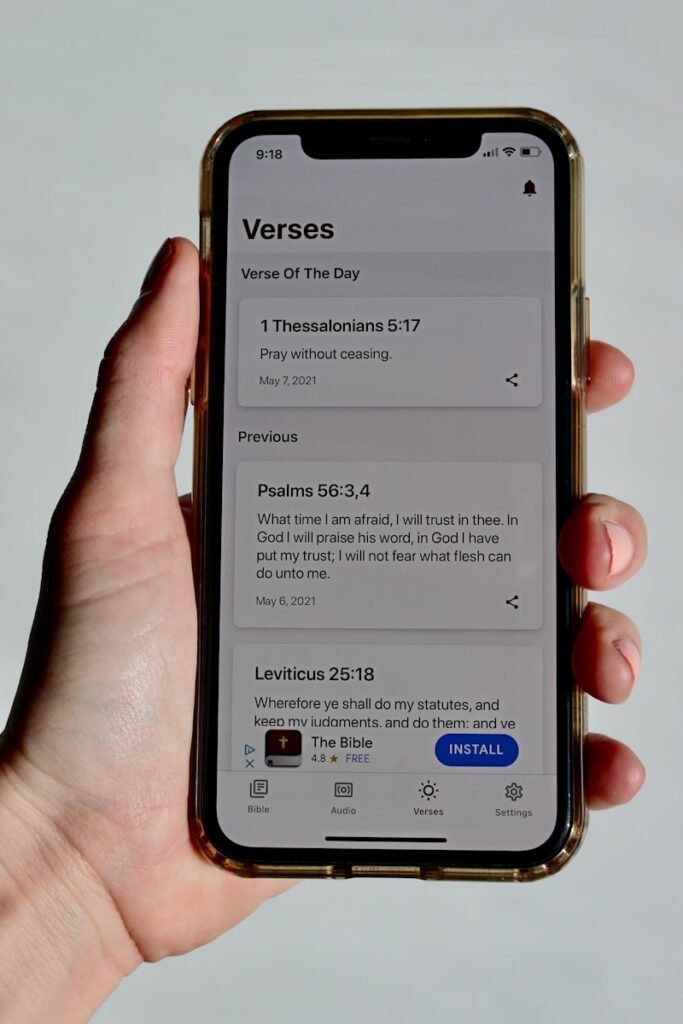Build Your Devotional Routine: A Guide to Faith

Introduction: What Is a Devotional Routine and Why It Matters 🌌
We all crave connection. Connection with God. Connection with purpose. Connection with peace. But in a chaotic world filled with deadlines, distractions, and doubt, that connection often slips through our fingers. It’s not that we don’t want to be close to God—it’s that life gets loud, and before we know it, our spiritual life starts to feel more like an echo than a dialogue. Without a structure, we drift. And when we drift, we struggle.
That’s where a devotional routine becomes a lifeline—a spiritual anchor that brings God into our everyday moments. It’s more than just reading Scripture or saying a quick prayer. It’s about intentionally creating sacred space for God to speak, move, and shape our hearts. This time with Him renews our perspective, refuels our spirit, and reminds us of who He is and who we are in Him.
Whether you’re just beginning, returning after a long pause, or needing a complete refresh, this post will guide you through building a devotional routine that’s personal, practical, and powerful. Let’s create a rhythm that nourishes your soul and strengthens your faith—not out of obligation, but from a deep desire to walk with Jesus every day. ✨

1. Start With the Right Heart ❤️
A devotional routine isn’t about perfection. It’s not a box to check, a race to win, or a religious badge to wear. At its core, it’s about posture—the posture of your heart when you come before God. This means approaching Him not with pride or performance but with humility and hunger. Are you coming to meet God, or are you trying to earn His approval? That heart-check makes all the difference.
Take a few minutes before each devotional time to reflect honestly: Am I seeking God because I feel guilty or because I love Him? Do I believe He desires to meet with me, or do I assume He’s distant and uninterested? Am I ready to listen, not just talk? These questions help align your motives with God’s invitation for relationship, not religion.
God isn’t asking for polish—He’s asking for honesty. Psalm 51:17 says, “The sacrifices of God are a broken spirit; a broken and contrite heart, O God, you will not despise.” Bring your weariness, your doubts, your distractions. Bring it all. The right heart isn’t perfect; it’s willing. And God always meets the willing.

2. Find Your Rhythm ⏰
Every life is different—and so is every devotional rhythm. Some people are natural early birds, rising with the sun to soak in Scripture before the world wakes up. Others feel most alert at night, processing the day through prayer and reflection before bed. There is no right or wrong time to meet with God—what matters is finding a time that’s consistent, protected, and realistic.
Start by identifying when you’re most focused. Is it during morning coffee before the kids wake up? During your lunch break at work? Or late at night once the house is quiet? Look at your daily routine and ask: When am I least likely to be interrupted? When can I offer God my best attention, not just my leftover energy? Let your devotional time be intentional, not accidental.
💡 Pro Tip: Start small. Begin with five to ten minutes a day, and grow from there. The goal is not how long you spend—it’s how engaged you are during that time. A consistent rhythm, even short, builds intimacy. Protect this time as you would any important meeting. Schedule it. Set a reminder. Let your loved ones know it’s sacred. Over time, it will become the most valuable part of your day.

3. Choose Your Tools ✏️📖
Your devotional routine should be equipped with tools that invite clarity, not clutter. While it’s tempting to try everything—study Bibles, devotionals, journals, apps, playlists—start with what nourishes your spirit. The simpler it is, the more sustainable it becomes. You want tools that guide you into God’s presence, not overwhelm you with options.
Some staple tools include: your Bible (start with Psalms or a Gospel), a trusted devotional book (New Morning Mercies, My Utmost for His Highest), a journal for writing prayers and reflections, and soft worship music to center your focus. Others enjoy visual reflections like Scripture art or drawing their meditations. The point is to make it personal.
Try a basic structure if you’re unsure where to begin: 1) Read a passage slowly. 2) Reflect on what it reveals about God and yourself. 3) Respond in prayer or journaling. Simplicity doesn’t mean shallow—it means focused. As you develop your rhythm, you’ll find the tools that help you hear His voice most clearly.

4. Use the Digital World for Good 📱
Let’s be honest—our phones can be both a blessing and a burden. They hold the power to connect us to inspiring messages, worship music, Bible apps, and devotionals. But they also tempt us with distractions that pull us away from sacred focus. The good news is that you can flip the script and use technology as a spiritual ally instead of a spiritual obstacle.
Start by downloading helpful devotional apps. The YouVersion Bible App is a free, popular option with hundreds of reading plans and audio devotionals. Lectio365 offers contemplative prayer and guided reflection for each day. If you’re someone who enjoys listening, Dwell presents Scripture in beautiful, soothing narration with background music. Glorify combines Scripture, journaling, and worship for a more holistic experience.
That said, be mindful of how easily you can go from reading Scripture to checking social media. Here are a few quick tips:
- 📵 Switch your phone to “Do Not Disturb” during devotional time.
- 📖 Use a physical Bible when possible.
- ⏳ Set a timer for 10-15 minutes to stay focused.
Technology is not the enemy—it’s a tool. Use it to create consistency and keep your faith walk alive when life feels hectic.
5. Add Accountability and Community 🤝
Spiritual growth was never meant to happen in isolation. While personal devotion is essential, God often uses community to deepen our faith and keep us encouraged along the way. Adding accountability to your devotional life doesn’t mean rigid rules or guilt trips—it means walking with others who also want to seek God daily. When you’re supported, challenged, and cheered on, it’s easier to stay the course.
Start simple. Invite a friend or loved one to read the same devotional or Scripture plan. Text each other a reflection or insight each day. Join a small group through your local church or an online community that meets weekly to discuss Scripture. Accountability doesn’t have to be formal to be effective—just intentional. Even a two-minute check-in can keep your momentum alive.
There’s something powerful about saying out loud, “I spent time with God today,” and knowing someone is praying with you and for you. Hebrews 10:24–25 encourages us to “spur one another on toward love and good deeds… not giving up meeting together… but encouraging one another.” Accountability sharpens your focus and community adds fuel to your fire. Don’t walk alone when you can walk together.

6. Stay Grace-Filled, Not Guilt-Filled ✨
Let’s be real—life gets messy. There will be days when you forget, oversleep, or simply don’t feel like spending time with God. In those moments, the temptation is to drown in guilt or give up entirely. But here’s the truth: God’s love isn’t tied to your performance. He delights in your desire, not your perfection.
When you miss a day, don’t spiral. Just come back. Lamentations 3:22–23 reminds us, “Because of the Lord’s great love we are not consumed, for His compassions never fail. They are new every morning.” Each day is a clean slate—a fresh invitation. Rather than seeing your devotional time as another task to master, view it as time spent with your loving Father who knows your heart and your struggles.
Replace guilt with grace. If you feel disconnected, start again. If you’ve been inconsistent, don’t wait for Monday or a new month—start right now. You’re not a failure for falling short. You’re a beloved child, growing in faith. Embrace grace and keep showing up.

7. Make It Personal and Powerful ✨🙏
Your devotional routine is not a one-size-fits-all experience. Just as God made each of us unique, your quiet time with Him should reflect your personality, lifestyle, and spiritual temperament. What works for one person might feel empty to another—and that’s okay. Your routine should draw you closer to God in a way that feels authentic, not forced.
For some, praying out loud brings clarity and comfort. For others, silent journaling helps organize thoughts and create space to hear God’s voice. Creative types may enjoy drawing, painting, or lettering verses as worship. Kinesthetic learners might go on prayer walks or listen to Scripture while exercising. Think outside the box—God is not confined to a pew or page.
Here are some ways to personalize your time:
- 🎶 Begin with a worship song to center your spirit.
- 📓 Journal a gratitude list or prayer each day.
- 🔁 Memorize one verse a week and repeat it throughout your day.
- 💬 Share what you’re learning with a trusted friend or online group.
Personalizing your devotional life makes it a joy, not a job. The more it reflects your heart, the more likely you are to keep coming back—not out of duty, but out of delight.
8. Conclusion: A Lifelong Journey With God 🌿
Building a devotional routine is not about reaching a spiritual “finish line.” It’s about starting and sustaining a lifelong relationship with God—one where you learn to walk with Him in every season, through every high and low. This is not a sprint. It’s a faithful, steady walk, one step at a time.
Over time, your devotional life becomes more than a habit. It becomes a sanctuary—a place where you process pain, celebrate victories, seek wisdom, and receive comfort. It becomes a sacred space where God meets you, molds you, and reminds you who you are. The more you practice this daily rhythm, the more your heart aligns with His.
So light that candle. Open your Bible. Whisper a prayer. God is already waiting for you—not because you’ve earned His presence, but because He loves you deeply. This journey won’t always be easy, but it will always be worth it. Start today. Start small. But start—and let your devotional routine become a powerful rhythm of grace that transforms your life.
Related Posts You May Love 😍
Why Worship Is More Than Music: Living Praise Daily
For the Love of Food: How the Table Connects Faith, Family, and Gratitude




